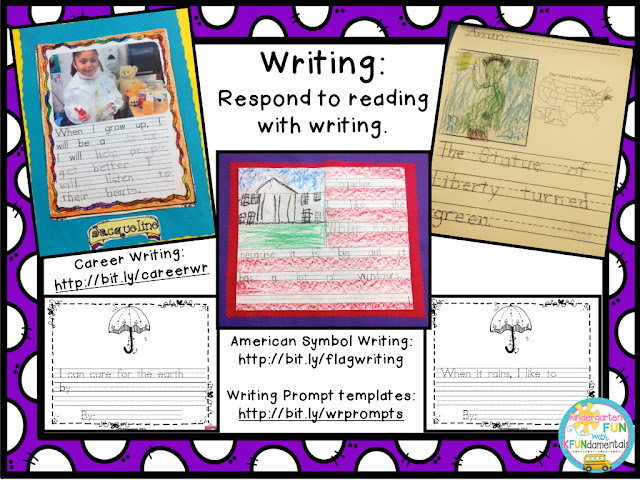Here is my Simple Guide to Guided Reading:
It looks like I'm the only blogger who continues to blog here, but since I still have quite a few followers, I'll continue to post around the 1st of each month. Here is a post I recently wrote for a private Facebook group. I hope you like my Simple Guide to Guided Reading:
First, you have to set up your Guided Reading Table:
First, you have to set up your Guided Reading Table:
Children love routines. It makes them feel safe and comfortable. But they also seek novelty and their motivation to learn is peeked when we present information in different ways. That said, I like to keep my Guided Reading routine the same each week, but each day I toss in some fun, new ideas.
Since Guided Reading is taught through small group instruction, and is designed to provide differentiated teaching that supports students in developing reading proficiency, I begin by assessing my students (see more on assessment below)and meeting with them in small, homogeneous groups. These groups are flexible and change as often as needed.
So what does a typical Guided Routine look like?
Basically, I like to plan my small group lessons around these concepts:
Monday: Alphabet Work: Phonemic Awareness, Phonics, and letter recognition.
Tuesday: Sight Word Work: Reading and spelling sight words (I limit my lessons to one or two sight words.)
Wednesday: Reading Strategy Work: Discussing and practice reading strategies such as blending, segmenting, stretching out words, etc.
Thursday: Comprehension Work: Practicing comprehension strategies such as digging deeper, looking for evidence, and re-telling stories.
Friday: Writing Work: Practicing writing by completing the writing prompt that relates to the story or topic that week.
How to bring novelty into your weekly Guided Reading routine?
Monday: Alphabet Work: (Phonemic Awareness, Phonics, and letter recognition)
We might focus on initial sounds by placing a cube on each image that begins with a particular letter.
We might use clear and colored spoons to practice word families or onset rimes. This cute idea came from Heidi's blog: http://blog.heidisongs.com
And we reinforce letter recognition by using alphabet pin cards, laminated letter tracing cards, and bingo markers that help us practice letter formation .
Tuesday: Sight Word Work: (1 or 2 Sight Words)
 |
| Click the image to grab the set of Pocket-Lockets. |
We create Sight Word charts where students use the sight word in a sentence, the teacher writes the sentence, and the student gets to sign their sentence.
We use my Pocket-Lockets set to create a pocket watch or a locket by spelling a particular sight word with letter squares. Students get to wear their pocket watch or locket home.
And we use choral reading to read our Sight Word Mini Books together.
We use laminated Dragonflies in First's cute iPhone templates to copy sight words or write a sentence using a sight word with dry-erase pens.
Wednesday: Reading Strategy Work: (Reading Strategies)
 |
| Click the image to grab this cute, FREE set of posters. |
We use multiple copies of small trade books, phonetic books, or familiar literature books to practice reading decoding strategies together. We discuss the strategies found on these FREE posters from Mrs. Ricca's Kindergarten and share how we used them to read.
Students also practice partner reading their book during this time.
Thursday: Comprehension Work: (Comprehension Strategies)
Students use their trade books, phonetic books, or familiar literature books to discuss new vocabulary, look for evidence in the illustrations or text, and re-tell parts of the story. Concepts of print, such as identifying characters, the setting, the problem, the solution, or sequencing parts of the story are also addressed.
Friday: Writing Work: (Writing Component)
 |
| Click the image to grab the American Symbol Flag Writing Template. |
Students respond to a writing prompt that relates to that week's story or a concept of print, such as the characters, the setting, etc. I use my Writing Prompts every Friday. We also used my Career Writing templates after reading about community helpers and my American Symbol Flag template after reading about our national symbols.
A Word About Assessments:
I have used ESGI for the past 8 years and it has saved me hundreds of hours assessing my students and using the amazing data to drive my instruction and RTI. It's easy, provides you with so much useful information about your students, and you students will LOVE it so much they will actually beg you to test them! Really! |
| Click the image above to grab your FREE trial! Remember to enter your code: KFUN. |
There you have it! I keep the routine the same, but I change out the way I teach each lesson or the materials I use. Sometimes I dress the part wearing a wig and windshield wiper sunglasses if we are discussing the letter W. And sometimes we will play an Onset Rime Hopscotch game. Keep it fresh and new!
Leave a comment and let us know about some great ideas YOU have for making Guided Reading fun!









